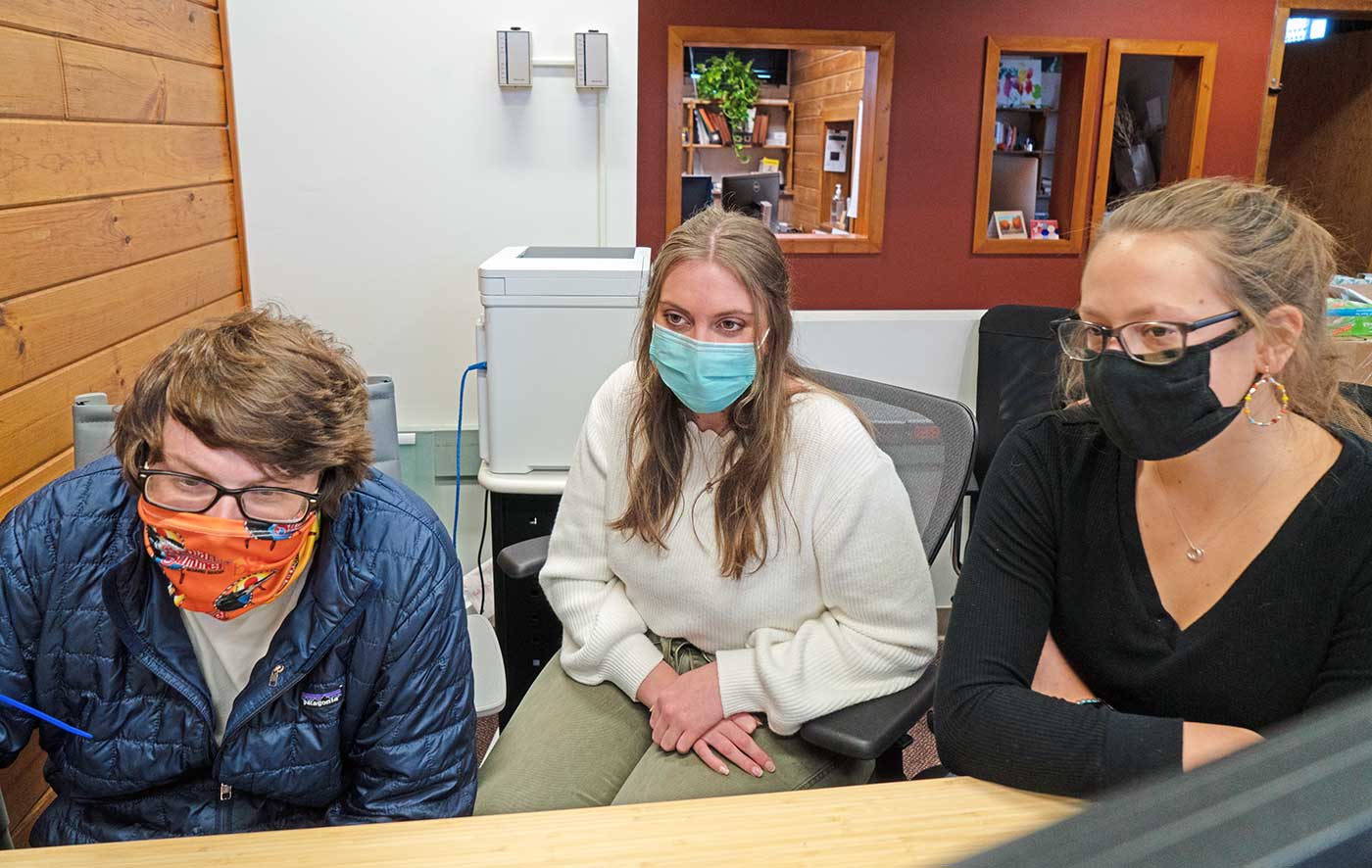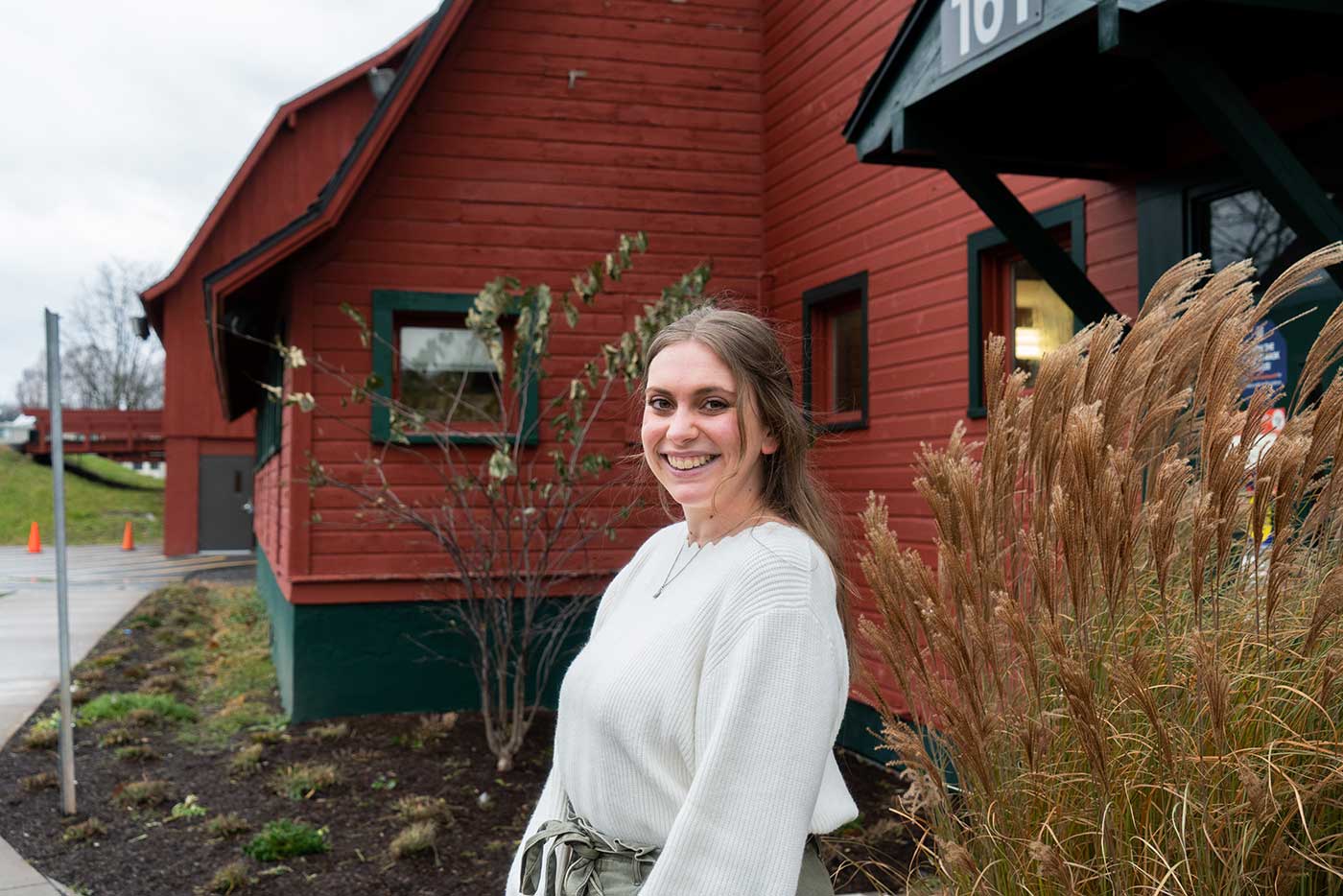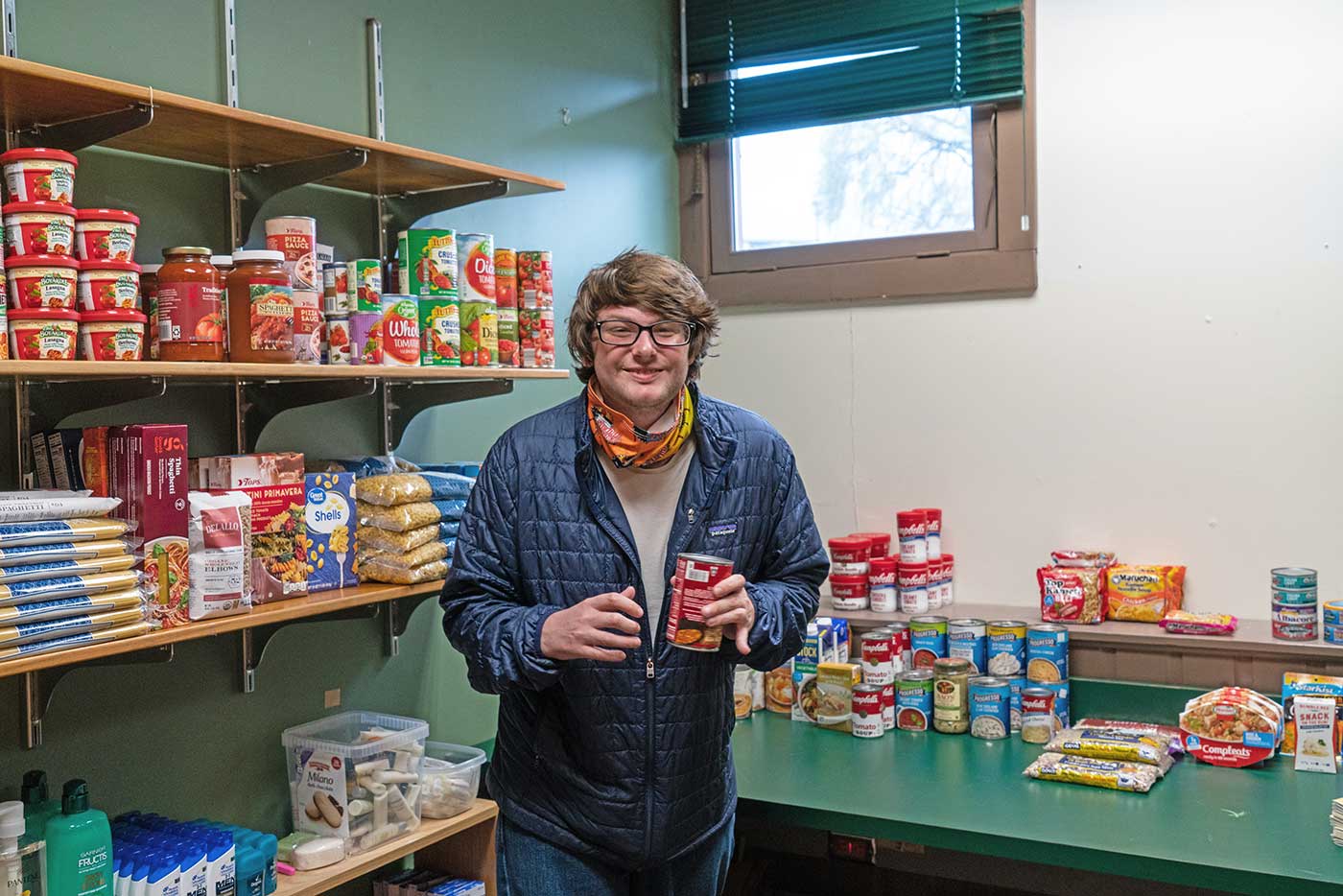
Before they graduate and make an impact in the world, Falk College seniors Claire Rein, Tucker Kopp and Caroline King made their impact on the Syracuse University campus as interns with the University’s Sustainability Management team.
Rein, Kopp and King interned in the Fall 2021 semester through Sustainability Management’s for-credit internship program that allows students to pursue projects that complement their major and explore their interest in sustainability.
“Our internship program is designed to allow students to explore their passions outside of the classroom environment while recognizing the broad impact sustainability has on all majors,” says sustainability coordinator Meg Lowe G’18, who manages the internship program. “At the same time, each project a student works on helps us achieve our goals with a current program or develop a new initiative on campus.”
Rein’s internship project focused on reducing plastic consumption, Kopp explored food insecurity, and King drafted a plan to implement more renewable energy on campus. Rein, who transferred to Syracuse in the fall of 2019, says her internship has so far been the highlight of her Syracuse experience.
“My internship made up for many of the things that I missed out on (because of pandemic restrictions),” Rein says. “I have incredibly supportive and friendly supervisors, as well as other amazing student interns that have made my experience so amazing! While I have learned a lot by doing my research project, I have also gained both a professional network and some great friendships.”
Sustainability Management works with each student’s advisor to ensure the internship aligns with the student’s academic goals, and a single internship can offer the chance to become immersed in several aspects of sustainability.
“We work closely with academic advisors to ensure we’re meeting the needs of every program,” Lowe says. “We hope each student walks away with a thorough understanding of sustainability in a way they can carry it throughout their life.”
As the three Falk College students concluded their internships, they shared more about their projects and experiences with us. Here are their stories:

Claire Rein: Set Up for Success
Growing up in Syracuse just a few miles from the University, Rein enjoyed singing, dancing, playing musical instruments and, of course, attending Syracuse Orange sporting events. She was attracted to Falk College’s Department of Public Health because of its experiential learning–the “the real-life application of knowledge” that she says has prepared her for a successful career in medicine.
“In my studies of public health, I have gained significant knowledge about the American healthcare system, healthcare disparities and social determinants of health, and how to do scientific research,” says Rein, who currently works as a patient care technician at St. Joseph’s Hospital in Syracuse. “I have been able to work with a high school equivalency class, participate in PTSD research, work at the Office of Sustainability Management for my internship, and much more.”
For her internship project on reducing plastic consumption on campus, Rein researched microplastics and their connection to public health, the issues with plastic recycling, and the social justice issues surrounding the plastic industry. She determined that aluminum cans are the best alternative and created a proposal for the University to transition to aluminum packaging for its vending machines.
“While the goals of recycling are great, the actual implementation does not match up,” Rein says. “Oftentimes, recyclables get contaminated and never end up being recycled, meaning they are either put in a landfill, incinerated, or end up polluting the natural environment.
“The industry was never designed to support such a large volume of recyclables,” Rein adds, “so our lack of recycling infrastructure in America has made it so that it’s sometimes not worth it economically to recycle.”
As she looks forward to graduation, Rein says she wants to positively influence the healthcare sphere by improving the experience for patients who are often overlooked and vulnerable.
“This could be, for example, implementing policies within my practice to better educate care plans to people with low healthcare literacy or language/cultural barriers; focusing care plans on the individual needs, perspectives and abilities of the patient; or finding ways to prevent socio-economic status from hindering the ability to receive excellent long-term care,” Rein says. “I believe being a public health major at Syracuse has really set me up for success when it comes to achieving these goals.”

Tucker Kopp: Ending Food Insecurity
Kopp grew up about 20 miles southeast of Syracuse in Cazenovia, where he started to ride horses when he was just 3. He also enjoyed baking and would spend hours baking with a friend, who sadly passed away last year.
Kopp enrolled at Syracuse University through InclusiveU, which provides opportunities for students with intellectual and developmental disabilities who want to experience college life in a fully inclusive setting. Kopp is a Food Studies major at Falk College, where his passion for baking and food is matched only by his enthusiasm for making friends.
“I’m a people person,” Kopp says, “I love to meet new people and make friends.”
Kopp is in his internship year at InclusiveU, and with Sustainability Management he studied food insecurity on college campuses. As Kopp points out, the Hendricks Chapel food pantry at Syracuse is stocked with food and personal care items that are available at no cost to all students with a valid Syracuse University or SUNY ESF ID.
“The most important thing I wish people knew about food insecurity on a college campus is how to use a food pantry if you don’t have enough money to buy food for yourself,” Kopp says.
InclusiveU Director Brianna Shults says Kopp grew “personally and professionally” from his internship, which was a valuable piece of his experience at the University and tied together his certificate in Culinary Arts with his career goals.
“After working alongside Meg (Lowe) and his other colleagues, Tucker better understands where food comes from and how hard it can be for some to access it,” Shults says. “Tucker valued his opportunities to participate in other projects, such as the virtual cooking class. His work at Sustainability Management really allowed him a new view on how food is experienced and accessed outside of traditional food services.”
Kopp’s education at Falk and his internship with Sustainability Management has given him options as his looks forward to his life and career after graduation.
“I want to do something with horses,” Kopp says. “But if that doesn’t work out, I want to do something culinary-related!”

Caroline King: Quality Healthcare for All
King grew up in the mountains of central Pennsylvania, where hiking and backpacking trips became her favorite hobby (she and her father still go on multiple backpacking trips every year). She entered Syracuse as a nutrition student but switched to a dual major in public health at Falk and policy studies at the Maxwell School of Citizenship and Public Affairs.
“As I aged, I began learning more about health disparities and the adversities faced in the healthcare system by minority communities,” King says. “I quickly developed a passion to be a part of the shift to providing equitable, affordable access to quality healthcare for all.
“Additionally, public health includes the health of the environment, which was an added attraction as my connection to the earth is strong,” King says.
For her internship, King researched renewable energy (RE) from a public health perspective. She looked at the sustainability of RE throughout its entire life cycle, from sourcing precious metals to the disposing of end-of-life RE systems.
With the information she gathered, King drafted a policy to propose to the University to use more RE on campus.
“I wish people would take the time to think about their energy consumption, where it’s coming from, and how big of an impact it’s causing on the planet,” King says. “It’s easy to put your consumption out of mind when the effects are out of sight, however, we need to be conscious of the impact that the things we do and purchase have on other people and the environment.”
King is a Renée Crown Honors Program student and member of the Phi Sigma Pi Gender-Inclusive National Honors Fraternity, where she has met students with various majors who share her vision of being part of a team that makes a difference in the lives of others.
“I wish people would understand the privilege they have to live the life they do so that they are able to empathize with people of all types around them,” King says. “As I move through jobs, careers and life, I hope to be in a position where I can be a part of a team that makes a large impact on a community, population or the environment.”
